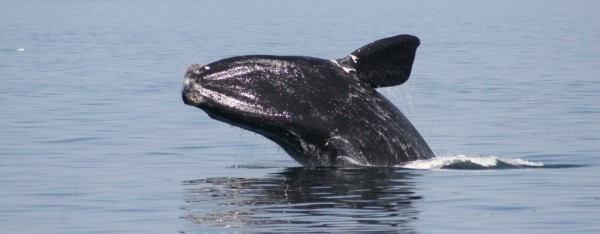East Coast Residents, Conservationists Back Bureau Finding That Seismic Blasts Harm Endangered Right Whales, Other Wildlife

WASHINGTON—(ENEWSPF)–May 2, 2017. Conservation groups have moved to intervene in an administrative appeal by the oil industry challenging a federal decision to reject six oil and gas exploration permits for the Atlantic Ocean. The Bureau of Ocean Energy Management denied the seismic airgun survey applications in part because the loud blasts would hurt endangered North Atlantic right whales and other sensitive wildlife.
In denying the permits, the Bureau found that the “small, critically endangered, and declining population of” North Atlantic right whales, which recent surveys say include an estimated 476 whales, “would doubtless be disturbed by seismic activity.”
“Seismic blasts are so loud they can injure endangered right whales and other marine mammals. We’ve been working to save right whales from extinction, and we’re intervening in this appeal to ensure the safety of these rare whales from oil and gas exploration,” said Kristen Monsell, an attorney with the Center for Biological Diversity.
President Trump issued an executive order Friday calling for the Department of the Interior to review its 2017-2022 offshore oil and gas leasing plan and all restrictions on offshore energy production, possibly opening up the Atlantic, Arctic and Pacific oceans to dangerous offshore drilling projects. Administration officials also said seismic testing in the Atlantic, which was removed from the final five-year plan, could proceed during that review.
Seismic exploration surveys use high-powered airguns to search for deposits of oil and gas. They generate the loudest human sounds in the ocean, short of explosives. The blasts, which can reach more than 250 decibels, can cause hearing loss in marine mammals, disturb essential behaviors such as feeding and breeding over vast distances, mask communications between individual whales and dolphins, and reduce catch rates of commercial fish.
In addition to the Center for Biological Diversity, today’s motion was filed by the Natural Resources Defense Council, North Carolina Coastal Federation, South Carolina Coastal Conservation League, One Hundred Miles and Defenders of Wildlife. The groups are represented by attorneys from NRDC, the Center and the Southern Environmental Law Center.
The Center for Biological Diversity is a national, nonprofit conservation organization with more than 1.3 million members and online activists dedicated to the protection of endangered species and wild places.
Source: http://biologicaldiversity.org








